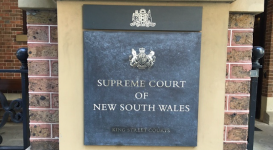Neville Wran’s Daughter Received Lower Sentence Due to Media Attention

A little after 7 pm on 10 August 2014, Brett Fitzgerald opened the door to his ground floor unit at a public housing complex in Redfern, where he lived with Daniel McNulty. It was known by some in the local area that Mr McNulty supplied drugs from the apartment.
Harriet Wran entered the residence, after previously identifying herself through a side window. She was immediately followed by Michael Lee, her boyfriend of two weeks, and Lloyd Haines, who was an associate of Mr Lee’s.
After unsuccessfully attempting to buy methamphetamines elsewhere, Haines suggested the trio rob McNulty using physical intimidation. Ms Wran agreed to the last minute plan.
However, it wasn’t until they entered the unit that she realised Lee was brandishing a knife and Haines had donned a balaclava.
Haines demanded Fitzgerald give them drugs and money. Fitzgerald armed himself with a metal shoe rack. Haines and Lee then forced McNulty and Fitzgerald into a bedroom. Lee stabbed McNulty in the chest, and Fitzgerald in the stomach and neck. Haines struck Fitzgerald over the head with a hammer.
The two intruders removed $650 and an undisclosed amount of drugs from beneath a mattress and fled the apartment. Ms Wran, who’d been waiting in the lounge room, followed the men. She attempted to make two calls to emergency services, but terminated them after Lee ordered her to.
The aftermath
An ambulance arrived at the units at 7.38 pm. Mr Fitzgerald was found in the car park of the complex. He was taken to St Vincent’s hospital suffering five wounds, and underwent surgery. Mr McNulty was found dead in the apartment, suffering a fatal stab wound.
Ms Wran and Mr Lee took a taxi to a house in Darlington, where Wran had arranged to stay with a friend. The two later became aware of media reports that one of the occupants of the unit had died from a stab wound.
On 12 August, Ms Wran was stopped by police at Liverpool Train Station for smoking on the platform. During a subsequent search, she failed to alert officers to the presence of Mr Lee, whom she knew to be involved in the murder. Lee was waiting around the corner.
On the following day, the pair were recognised by police at Liverpool Station. They were arrested and taken into custody in relation to the aggravated robbery.
Guilty pleas
On 6 August last year, Ms Wran pleaded guilty to two charges. The first was one count of robbery in company, contrary to section 97 of the Crimes Act 1900. The offence carries a maximum penalty of 20 years imprisonment.
Ms Wran also pleaded guilty to one count of being an accessory after the fact to murder in accordance with section 349 of the Crimes Act. A maximum penalty of up to 25 years applies to that offence.
On 14 August last year, Ms Wran appeared before Justice Harrison for sentencing in the NSW Supreme Court.
Regrettable attention
Justice Harrison noted that the proceedings had attracted significant media attention, as Ms Wran is the daughter of former NSW premier Neville Wran. His Honour stated that much of the coverage was “the result of a misunderstanding, fuelled to a degree by ill-informed reporting.”
Amongst the coverage was a perception that Ms Wran was subject to “special treatment or favouritism,” as an initial charge of murder was later dropped by the Director of Public Prosecutions, and substituted with the existing charges.
The objective gravity
For robbery in company, Justice Harrison found that Ms Wran’s offence was “towards the lower end of objective seriousness for offences of its kind,” as she had played no part in the events that unfolded once entry was gained into the apartment.
Ms Wran took no part in the violence that ensued, nor did she take any property from the unit. Indeed, she was shocked by what took place and concerned about the welfare of the occupants, as was demonstrated when she attempted to make two emergency calls.
As for the charge of accessory after the fact, His Honour found the offence fell “at the bottom of the range of objective seriousness for offences of its kind.” Ms Wran’s liability was not due to what she did, but what she failed to do.
The offender hadn’t notified the police to the whereabouts of Mr Lee. And Justice Harrison reasoned that this was due to her drug dependency, and the fact that Lee had recently become the source of illicit substances.
His Honour also found that Ms Wran should be given a full 25 percent discount on her sentences for entering guilty pleas to both offences, as they had “significantly assisted the course of justice.”
Adverse media coverage
“Ms Wran has been subjected to a sustained and unpleasant campaign by some of the daily newspapers circulating in Sydney,” Justice Harrison said. This included “allegations about her criminality, sexual conduct and reputation” that had no basis in fact.
His Honour found that the newspaper articles warranted “the imposition of a sentence that takes account of Ms Wran’s continuing exposure to the risk of custodial retribution,” her damaged reputation, and impediments to “recovery from her ongoing mental health and drug-related problems.”
The Justice further found that the fact Ms Wran was held in maximum security during the 2 years she spent on remand should be factored into sentencing, as she was placed in this “harsh custodial environment” due to her unwanted public profile.
The sentence
During sentencing, His Honour noted that Ms Wran had shown genuine remorse after the incident. As she had also begun to deal with her drug dependency, and her long-term mental illness, the judge found she had good rehabilitation prospects and was unlikely to re-offend.
On 26 July last year, Justice Harrison sentenced Ms Wran to 4 years imprisonment, with a non-parole period of 2 years. Her sentence was backdated to the day she was placed into custody. She has since been released from prison.








